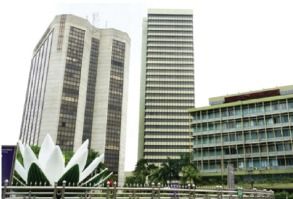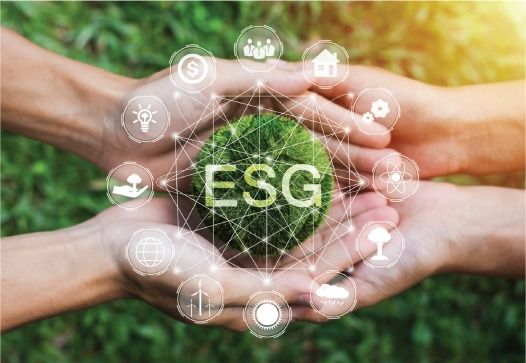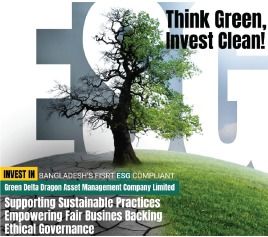- info@ficci.org.bd
- |
- +880248814801, +880248814802
- Contact Us
- |
- Become a Member
- |
- |
- |
- |
- |

ESG (Environmental, Social, and Governance) investing has emerged as a transformative force in the global financial landscape, and Bangladesh is progressively acknowledging its potential. ESG criteria assess a company's commitment to environmental sustainability, social responsibility, and ethical governance. This shift aligns with the growing global awareness of the systemic risks posed by climate change, as evidenced by unprecedented droughts, floods, and other natural disasters that disrupt communities, supply chains, and economies worldwide.
As of 2023, the size of ESG-driven investments was estimated to exceed $40 trillion and has been growing at a rate of 15%-20% over the past few years and is expected to grow at similar rate, if not faster, in coming years. Bangladesh is significantly missing out in attracting such investments at present due to slow integration of ESG factors into the economy. ESG integration into the system should be one of the critical areas that get addressed under the major ongoing reforms that are being incorporated/established by interim government led by Doctor Yunus after the July Revolution; and a solid roll-out plan must be formulated for immediate execution. First and foremost, this may include the integration of ESG reporting in order to attract greater foreign investment and position itself as a forward-thinking, sustainable market.
 Bangladesh Bank (BB) has been the pioneering force in advancing sustainable finance and addressing climate risks in the financial sector. In 2011, BB launched the Green Banking initiative to promote financing for environmentally friendly projects, introducing the concept of green banking in Bangladesh. In 2020, it implemented the "Sustainable Finance Policy", requiring banks and NBFIs to allocate at least 5% of term loan disbursements to green financing and 20% to sustainable finance. As a result, green financing rose from 4.0% in 2020 to 15.2% by September 2024, while sustainable financing grew from 8.0% in 2021 to 39.2% in September 2024, reflecting the financial sector's growing commitment to sustainability. BB issued guidance for banks and financial institutions on reporting and disclosure based on IFRS S1 and S2, marking a significant step towards aligning national and international standards. BB's adoption of IFRS S1 and S2 addresses standard- ization gaps, but effective implementation requires substantial investment in training, system upgrades, and compliance. Policymakers may reinforce the adoption by offering initial incentives to help companies reduce these costs.
Bangladesh Bank (BB) has been the pioneering force in advancing sustainable finance and addressing climate risks in the financial sector. In 2011, BB launched the Green Banking initiative to promote financing for environmentally friendly projects, introducing the concept of green banking in Bangladesh. In 2020, it implemented the "Sustainable Finance Policy", requiring banks and NBFIs to allocate at least 5% of term loan disbursements to green financing and 20% to sustainable finance. As a result, green financing rose from 4.0% in 2020 to 15.2% by September 2024, while sustainable financing grew from 8.0% in 2021 to 39.2% in September 2024, reflecting the financial sector's growing commitment to sustainability. BB issued guidance for banks and financial institutions on reporting and disclosure based on IFRS S1 and S2, marking a significant step towards aligning national and international standards. BB's adoption of IFRS S1 and S2 addresses standard- ization gaps, but effective implementation requires substantial investment in training, system upgrades, and compliance. Policymakers may reinforce the adoption by offering initial incentives to help companies reduce these costs.
Another key ESG regulatory initiative comes from the Bangladesh Securities and Exchange Commission (BSEC), which, through its Corporate Governance Guidelines (2006, 2012, and 2018), mandated corporate governance disclosures for listed companies. It is encouraging regulatory bodies to take steps to integrate ESG; however, the measures implemented by BSEC appear inadequate, as they primarily emphasize governance while disregarding the environmental and social considerations.
ESG reporting in Bangladesh is lagging neighboring countries, with the Dhaka Stock Exchange (DSE) recording one of the lowest environmental sustainability disclosure rates in South Asia. According to the Global Reporting Initiative (GRI) database, only 49 companies submitted sustainability reports in 2020, with just 11 meeting GRI guidelines, compared to India's 498 reports, of which 74 adhered to GRI standards. Following India's approach, mandatory ESG reporting for top companies may be introduced to improve disclosure rates. However, gaps in data and expertise must first be addressed. While firms are experienced in financial reporting, ESG data knowledge remains limited. Accounting bodies, with government support, should implement training programs to build professional expertise in ESG reporting.

ESG is not only crucial for attracting foreign investment but also fundamental to Bangladesh's long-term prosperity, given its high vulnerability to the impacts of climate change. Ranked 9th in the World Risk Report 2024 for climate disaster risk and 7th in the 2021 Global Climate Risk Index, the country has faced climate-related GDP losses of 0.41% from 2000 to 2019. Bangladesh could become a champion in meeting the carbon emissions targets set by the Paris Agreement through successful implementation of environment related regulations and incentives in the home front. While doing so, Bangladesh could also be a strong voice in the international community that other partner countries also adhere to their pledge. The future of the next generation lies with the decisions and initiatives taken by us today.
 While progress has been made, particularly in the challenges persist in Bangladesh's ESG integration. Inadequate reporting, data gaps, and limited expertise hinder broader implementation across sectors. Overcoming these challenges is critical for Bangladesh's sustainable development, climate resilience, and investment appeal. Strengthening regulatory frame- works, investing in capacity building, and raising investor awareness are essential for unlocking the full potential of ESG principles and securing long-term prosperity of Bangladesh.
While progress has been made, particularly in the challenges persist in Bangladesh's ESG integration. Inadequate reporting, data gaps, and limited expertise hinder broader implementation across sectors. Overcoming these challenges is critical for Bangladesh's sustainable development, climate resilience, and investment appeal. Strengthening regulatory frame- works, investing in capacity building, and raising investor awareness are essential for unlocking the full potential of ESG principles and securing long-term prosperity of Bangladesh.





